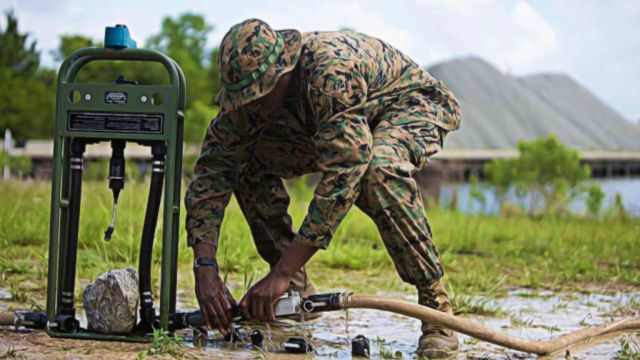Between August 1, 1953, and December 31, 1987, veterans, service members, and their families who resided and worked at Camp Lejeune and Marine Corps Air Station (MCAS) New River, North Carolina, inadvertently used and drank tainted water for decades.
Numerous types of cancer, neurological problems, and life-threatening diseases were among the severe health conditions brought on by this hazardous exposure.
Veterans and their families now have an easier time qualifying for VA disability compensation and healthcare benefits thanks to recent legislation, such as the Camp Lejeune Justice Act and modifications to VA’s presumptive service connection criteria.
This article will explain eligibility, the claims procedure, typical mistakes to avoid, and how to optimize your VA benefits if you or a loved one were exposed to tainted water at Camp Lejeune.
Presumptive Conditions for Exposure to Toxins at Camp Lejeune
According to VA, veterans who served at Camp Lejeune or MCAS New River for at least 30 total days between August 1, 1953, and December 31, 1987, are presumed to have the following health issues.
List of Presumptive Conditions for Camp Lejeune
- Leukemia in adults
- Myelodysplastic disorders, including aplastic anemia
- Cancer of the bladder
- Cancer of the kidneys
- Cancer of the liver
- Myeloma multiplex
- Non-Hodgkin’s disease
- Parkinson’s illness
A Presumptive Condition: What Is It?
Veterans typically need to show proof that their condition was directly brought on by their military service in order to file a VA disability claim.
On the other hand, if the veteran satisfies the exposure requirements, VA will immediately assume a service connection under presumptive conditions.
This implies:
- There is no requirement to establish a direct link between the sickness and military duty.
- Processing claims more quickly and increasing the likelihood of approval
Who Can Receive VA Benefits at Camp Lejeune?
If you fulfill the following criteria, you might qualify for VA disability benefits:
- Between August 1, 1953, and December 31, 1987, you spent a minimum of 30 days in service at Camp Lejeune or MCAS New River.
- Your discharge was either general or honorable (not dishonorable).
- One of the presumptive conditions recognized by the VA has been identified in your diagnosis.
VA Healthcare Benefits Eligibility for Family Members
Family members who were diagnosed with one of the 15 covered diseases listed below and who resided at Camp Lejeune during the same period may also be eligible for VA healthcare benefits:
- Cancer of the bladder
- Cancer of the breast
- Esophageal cancer
- Infertility in women
- Steatosis of the liver
- Cancer of the kidneys
- Leukemia
- Cancer of the lung
- Miscarriage
- Myeloma multiplex
- Syndromes of myelodysplastics
- Effects of neurobehavior
- Non-Hodgkin’s disease
- Toxicology of the kidneys
- Scleroderma

Typical Neurobehavioral Impacts of Exposure at Camp Lejeune:
- Cognitive decline and memory loss include early-onset dementia symptoms, brain fog, and trouble remembering details.
- An elevated risk of mood disorders, such as severe depression and widespread anxiety, is associated with depression and anxiety disorders.
- Motor Dysfunction: Parkinson’s disease may be connected to tremors, muscle weakness, and coordination issues.
- Sleep disturbances include persistent sleeplessness, restless nights, or symptoms similar to sleep apnea.
- Headaches and Migraines: Chronic headaches that are frequently severe and unresponsive to therapy.
- Nerve pain, tingling, or numbness in the hands and feet are symptoms of peripheral neuropathy.
- Changes in mood and personality, such as heightened irritation, hostility, or emotional instability.
VA Chapter 31 Benefits: How VR&E Services Can Support Your Career and Education
Advantages of VA for Neurobehavioral Impacts
Neurobehavioral impacts are one of the 15 covered conditions the VA recognizes as qualifying family members for healthcare benefits under the Camp Lejeune Family Member Program.
Veterans who experience neurological problems may still submit a claim and offer medical documentation attesting to the connection between their condition and the toxic exposure at Camp Lejeune, even though the VA does not classify neurobehavioral impacts as a presumptive diagnosis for veterans.
How to Submit a VA Benefits Claim for Camp Lejeune?
First Step: Verify Eligibility
Make sure that throughout the eligibility period, you spent a minimum of 30 days living or serving at Camp Lejeune or MCAS New River.
Step 2: Compile the Necessary Records
- Medical records attesting to a presumptive condition’s diagnosis
- Military documents attesting to service at Camp Lejeune (DD-214 or equivalent)
- Documents demonstrating residency for family members, such as utility bills, housing records, or base access records
Step 3: Submit a VA Claim
- Online: Use VA.gov to file your claim.
- Through the mail, submit your filled-out VA Form 21-526EZ to the VA claims processing facility.
- In-Person: Seek help at a VA Regional Office.
Step 4: Attend a Compensation & Pension (C&P) Exam
- In order to verify your diagnosis and determine your disability rating, the VA will probably arrange a C&P exam.
- Talk about how your illness affects your day-to-day activities in an uncomfortable way.








